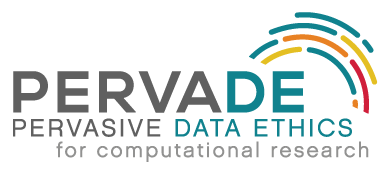The Project
PERVADE was conceived during the Consortium for the Science of Sociotechnical Systems (CSST) 2016 Summer Institute Catalyst Working Group, an NSF-supported research coordination network (Grant #1144934). CSST enabled discussion around networked information technologies, such as the internet of things, wearable devices, ubiquitous sensing, and social sharing platforms. These devices and platforms increased the flow of rich, but often personal, information available for computing research.
The growth in the scale, scope, speed, and depth of human data research—what we call pervasive data practices—requires reconsideration of fundamental ethical assumptions.
How do we quantify the risks to individuals and groups in the use of pervasive data? How do people experience the reuse of their personal data? And how should existing ethical codes be adapted and adopted for computational research? PERVADE: Pervasive Data Ethics answers these questions by:
- discovering metrics for assessing and moderating risks to data subjects;
- modeling user concerns for computational researchers;
- discovering how existing ethical codes can be adapted and adopted for computational research;
- understanding the impact of academic and corporate regulators;
- and disseminating evidence-based best practices for research ethics.
Attention to research ethics in this domain must be as pervasive as the field itself, encompassing multiple perspectives, stakeholders, and approaches. PERVADE’s multi-disciplinary team conducts a suite of empirical projects to rethink computational research ethics. PERVADE is made up of sub-projects which explore Technical Investigations, User Communities, Computing Research Communities, and Data Ethics Regulators.
Explore our website to learn more about PERVADE!
Our Guiding Research Questions
Open questions in pervasive data ethics include empirical questions focused on 1) risks within data itself; 2) beliefs and opinions in user communities; 3) beliefs and practices in computing research communities; and 4) practices among regulators and policymakers such as IRBs. Therefore, our guiding research questions are organized around these stakeholder communities. They include:
- Interrogating data: What metrics should be developed to assess and moderate risks to data subjects?
- Representing user communities: How do user attitudes and media reactions shape subjects’ willingness to participate in pervasive data research? And how might user concerns be modeled in ways accessible to computational researchers?
- Discovering beliefs and practices in computing research communities: How can existing ethical codes be adapted for the real-world working conditions of sociotechnical and cyber-human research?
- Understanding regulators: How do the changing practices of academic and corporate regulators impact users and researchers?
- Spanning all stakeholders: What are the tradeoffs of different approaches to research ethics in this field and what best practices are most easily implemented and sustainable?
